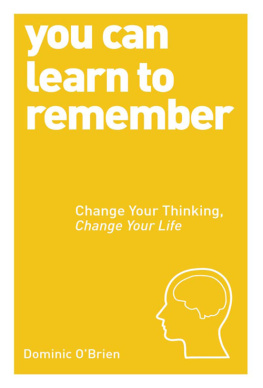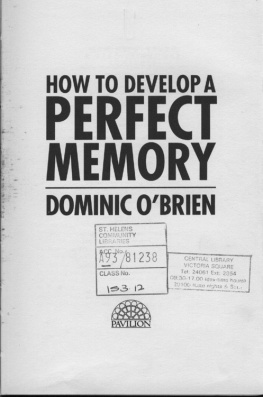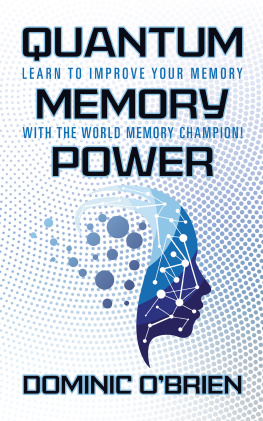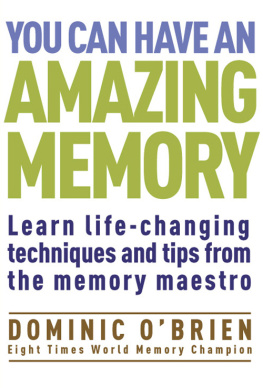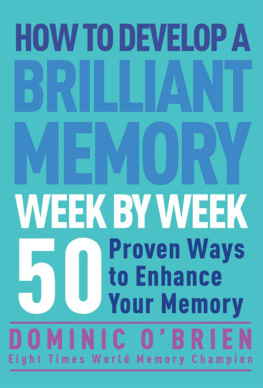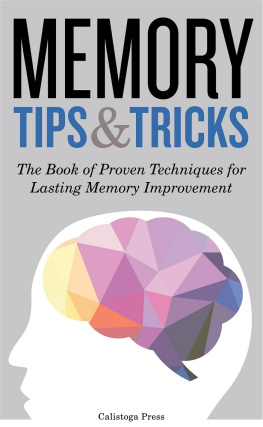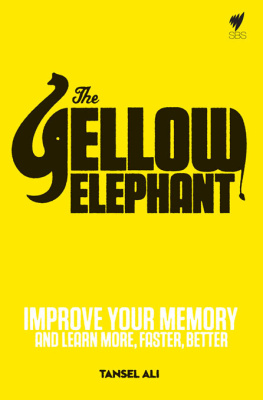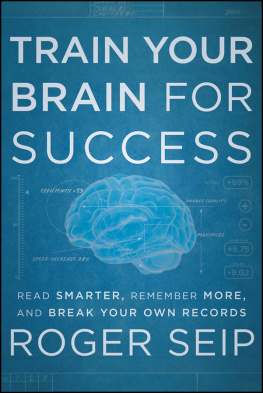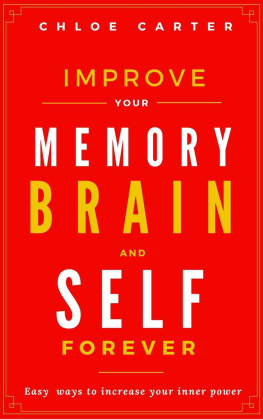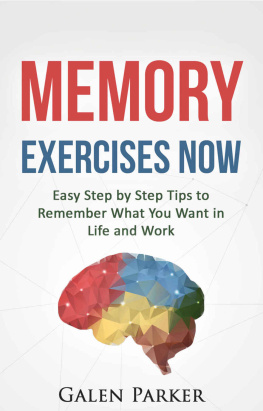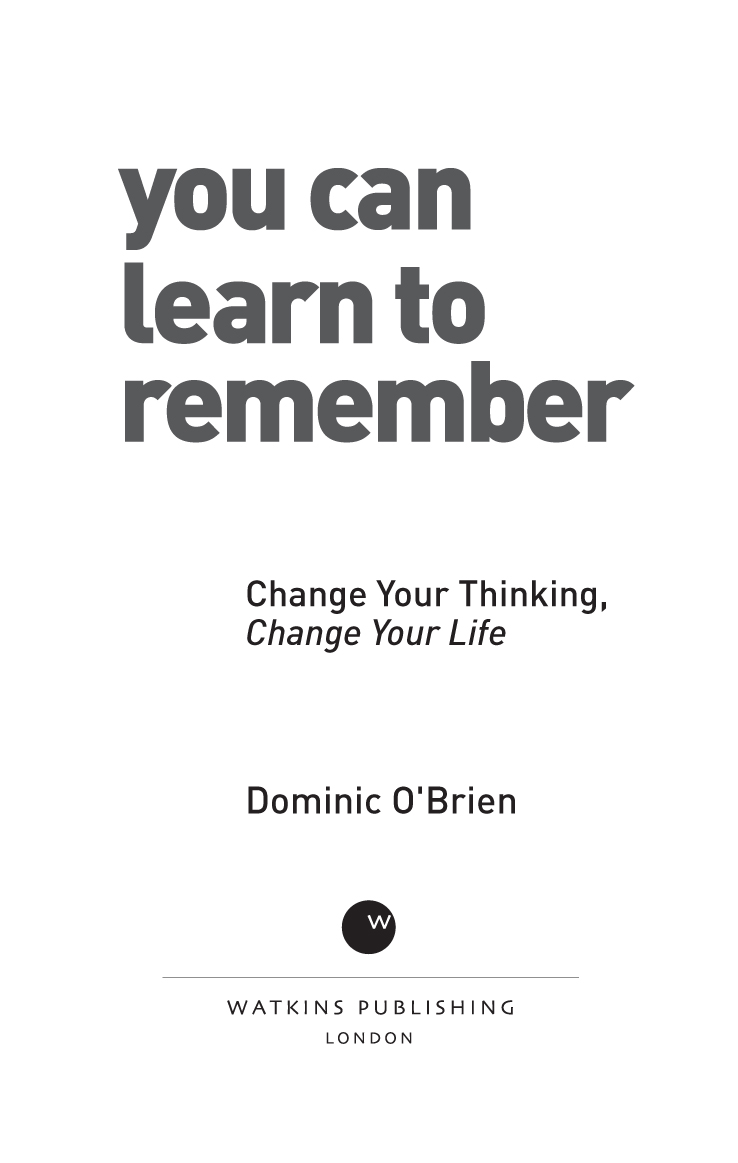Dominic OBrien is renowned for his phenomenal feats of memory and for outwitting the casinos of Las Vegas at blackjack. He has won the World Memory Championship eight times, holds a host of world records and was named Brain of the Year in 1994 and Grandmaster of Memory by the Brain Trust of Great Britain. He is President of the World Memory Sports Council. His books include Learn to Remember and How to Develop a Brilliant Memory Week by Week.
This book is dedicated to everyone who takes part in mind sports.
H i, Dominic. How come youre entering this year? I hear youre forty-two years old. This was the question asked of me by a seventeenyear-old American student on the first day of the 1999 World Memory Championships. I was told that he had been training his memory for six hours a day for the past six months and was in London for one reason and one reason only: to become World Memory Champion.
Although I believe his opening question was part gamesmanship, many people would argue that this was, in fact, a fair comment. A bright, seventeen-year-old college student should certainly have the edge over a forty-two-year-old codger like me. After all, isnt the memory capacity of a human being supposed to decline with age?
Up until 1988, if someone had asked me that question, I would certainly have answered yes. In giving that answer, I would have been echoing a popular misconception about memory that old age and forgetfulness are synonymous. But, in 1988, I was to witness an event that would change my life. I watched a man called Creighton Carvello memorize a randomly shuffled deck of playing cards in just under three minutes a feat of memory which put his name in the record books. I was dumbstruck. How could anyone connect 52 unconnected pieces of data together, perfectly in sequence, using nothing but their brain, in such a short space of time? Inspired and fuelled by a burning desire to uncover Creightons secret, I armed myself with a deck of cards and began a three-month investigation into the potential of my own memory. What followed was an object lesson in accelerated learning. A process of natural selection took place as I threw out ideas that failed and refined techniques that produced results. As each day passed I felt as though I was awakening a giant within me. For the first time in my life, not just my memory, but also my powers of concentration and imagination, were beginning to reveal a potential that I never before realized they had. Unwittingly, I was discovering the art of memory and memory techniques as practiced by the ancient Greeks more than two thousand years ago.
setting your sights
On the first day of your memory training, you may remember only two or three items from a list. By the next day, you may recall as many as 10; by the following week, 20. Here are a few world records to aspire to!
In 1999 I memorized the order of 18 decks of shuffled playing cards (936) in one hour without a single error. In 2002 at Simpsons-In-The-Strand, London, I memorized a random sequence of 54 decks. All 2808 cards were shuffled into each other and I had only a single sighting of each card. I recalled the entire sequence with just eight errors. This is the current world record for the most cards memorized after a single sighting. Ben Pridmore holds the current record for the fastest time to memorize one pack of 52 playing cards, which he did in 24.68 seconds in 2008.
After three months of memory training I felt that I had been given a new brain. Soon after, I was entering the record books myself by memorizing not one, but six randomly shuffled decks of playing cards from a single sighting of each card. While I was amazed and impressed by my own brains capacity, I felt at the same time immensely bitter that I had never been taught these same levels of mental agility when I was student struggling with examinations.
As a child, I was diagnosed as dyslexic. In addition, I was described as having an inability to concentrate on and remember what my teachers were saying. As a result, I did not shine academically, and I left school at sixteen. What a shame that I was never shown the techniques described in this book. Even today, when we know comparatively so much more about the brain and the processes of learning, children are not taught how to learn effectively. Why? I have to confess that the answer to that question escapes me.
For the past few decades we have been concentrating on toning our bodies to make them appear beautiful; and we have been tuning our diets and lifestyles to keep ourselves physically healthy. With the advent of a new millennium, it now seems appropriate that we start nurturing, exercising and keeping healthy the command and control centre of our physical selves the brain.
My hope is that by reading the text and experimenting with the exercises in this book you too will discover the giant within you and what a giant!
And, by the way, that forty-two-year-old went on to collect a sixth World Memory Championship title.
Dominic OBrien
a brief history of memory
from ancient times to the modern age
W e may regard memory as one of humankinds oldest arts. To our ancient ancestors, it was not just a useful aid to survival, but an integral part of daily life. In the absence of the printing press, memory was the slate on which history was recorded. This was how we sorted information to help us make sense of the world. Reference devices were more primitive as well as thinner on the ground, so if facts and figures were to be at the fingertips of the ancients, they had to be remembered a job for intellect and imagination. Throughout this early period of history, a good memory was a prerequisite for success: epic poets, notably Homer, memorized their works long before they were ever written down; and politicians, theologians and philosophers persuaded their audiences by delivering effective and convincing speeches, the memory cues for which were visualized colourfully in their heads. In this chapter we look at how memory has been used and understood through the ages.
oral traditions
A s children, and even as adults, some of the most wonderful stories we hear are those of our own ancestry tales that have travelled along the branches of our family tree like an army of determined ants. With each retelling, slight changes may be introduced per haps an embellishment or exaggeration to hold the wandering attention of a restless young listener, or an invention or two to bridge an awkward gap in the known facts. This is how memories are polished to make them smoother and easier to pass on to others. Yet the basic body of information usually remains broadly intact. By listening to dozens of stories, we accumulate a knowledge of our past. We may look at old family photographs, but without the context that memories whether first- or second-hand supply, such physical records are merely visual ciphers.
If we go way back in time, before the invention of the personal organizer, before we had diaries or even writing, we revisit an age when oral tradition was the only method of passing memories from one generation to the next. Anything not recounted for the benefit of others would disappear from the collective consciousness, forgotten for ever. Hence, enormous importance was placed upon memory among the ancients it was recognized that without memory and reminiscence the cultural heritage would be lost. There were a few libraries in ancient Athens, and there was also a limited book trade, but these were no substitute for a wise man with a good memory.

